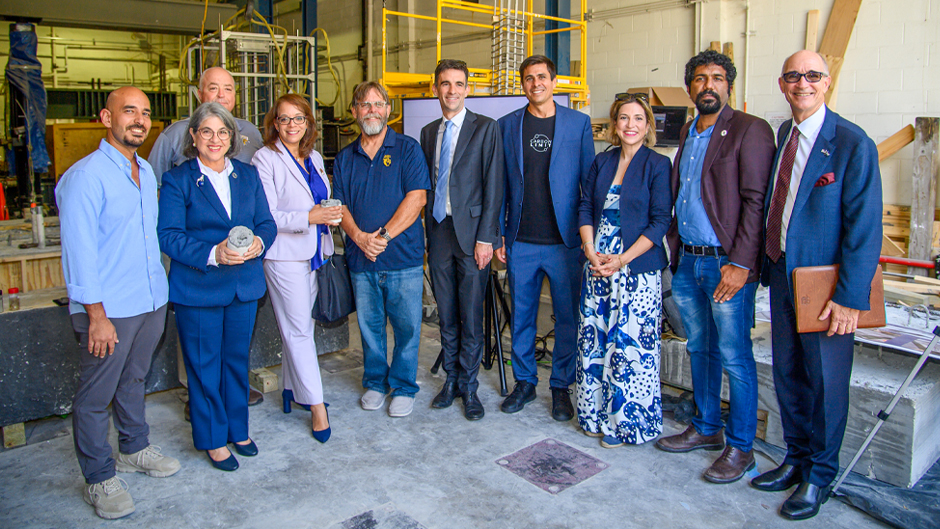University of Miami researchers are pursuing innovative solutions to combat impacts of climate change, including higher heat indexes, stronger storms, and frequent flooding.
A new $2.3 million grant from the U.S. Economic Development Administration will now help the College of Engineering and the University’s Climate Resilience Academy to further advance concrete technologies, train employees to enter the green workforce, and support startups in creating new green technology.
U.S. Assistant Secretary of Commerce for Economic Development Alejandra Castillo was in Miami last week to announce the $19.5 million in funding for the ClimateReady Tech Hubs program, led by Miami-Dade County. The South Florida ClimateReady Tech Hub is one of only 12 across the nation that aims to advance the region’s global leadership in sustainable and resilient infrastructure, with a focus on bringing clean cement and concrete to market. The hub will also promote innovative coastal protections, like SEAHIVE breakwaters and heat-resilient corals, as well as sustainable energy in future proposals.
"This is an important step in the innovation ecosystem,” said Michael Berkowitz, executive director of the Climate Resilience Academy, who also serves as academic representative on the hub’s steering committee. “South Florida can and should lead the country, if not the world, in infrastructure that helps us adapt to climate change. This announcement should be the first of many funding opportunities for the University of Miami and the region in climate readiness technology.”
Cutting carbon emissions with innovative concrete solutions
The lead University investigators on the grant are Berkowitz and Prannoy Suraneni, associate professor of civil engineering. Both will work with industry partners on developing and testing cleaner, more durable concrete, which can help to lower carbon emissions while lasting longer and performing better. An expert in cement chemistry, Suraneni will lead testing with industry partners to evaluate the performance of these novel concrete materials in real-life conditions.
One such innovation is ternary cement, developed by Titan Florida, which reduces carbon dioxide emissions by 40 percent. Another is CaptureCrete from Carbon Limit, a powder additive that enhances the captures of CO2 in concrete. Such technologies can enable the construction of homes, buildings, bridges, roads, and other key infrastructure with a lower carbon footprint, while also lasting longer than conventional materials. This grant also builds on long-standing collaborations between the College of Engineering and Titan America, which have resulted in federal funding for clean limestone calcined clay cement production and deployment.
“This funding is part of a larger ecosystem that's thinking about creating better materials, better designs, and better production methods to ensure sustainable and resilient infrastructure for the future,” Suraneni added. “At the same time, we will develop the workforce and work with numerous startups. Thus, this grant will have a major, long-term positive outsized impact on the region, both for personnel and technology.”
Added Berkowitz: “When we look back in 10 years, we'll say this moment was the beginning of a revolution.”

